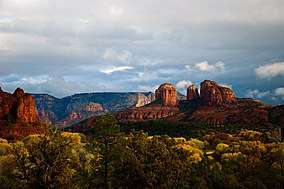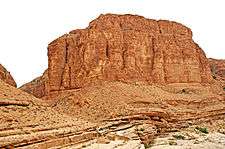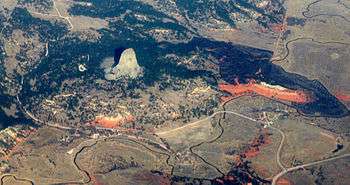Red beds
Red beds (or redbeds) are sedimentary rocks, typically consisting of sandstone, siltstone, and shale, that are predominantly red in color due to the presence of ferric oxides. Frequently, these red-colored sedimentary strata locally contain thin beds of conglomerate, marl, limestone, or some combination of these sedimentary rocks. The ferric oxides, which are responsible for the red color of red beds, typically occur as a coating on the grains of sediments comprising red beds. Classic examples of red beds are the Permian and Triassic strata of the western United States and the Devonian Old Red Sandstone facies of Europe.[1][2]



Primary red beds
Krynine (1950) suggested that the red beds were primarily formed by the erosion and redeposition of red soils or older red beds, but a fundamental problem with this hypothesis is the relative scarcity of red-colored source sediments of suitable age close to an area of red-bed sediments in Cheshire, England. Van Houten (1961) developed the idea to include the in situ (early diagenetic) reddening of the sediment by the dehydration of brown or drab colored ferric hydroxides. These ferric hydroxides commonly include goethite (FeO-OH) and so-called "amorphous ferric hydroxide" or limonite. Much of this material may be the mineral ferrihydrite (Fe2O3 H2O).
This dehydration or "aging" process has been found to be intimately associated with pedogenesis in alluvial floodplains and desert environments. Berner (1969) showed that goethite (ferric hydroxide) is normally unstable relative to hematite and, in the absence of water or at elevated temperature, will readily dehydrate according to the reaction:
- 2FeOOH (goethite)→ Fe2O3 (hematite) +H2O
The Gibbs free energy (G) for the reaction goethite → hematite (at 250 °C) is −2.76 kJ/mol and Langmuir (1971) showed that G becomes increasingly negative with smaller particle size. Thus detrital ferric hydroxides, including goethite and ferrihydrite, will spontaneously transform into red-colored hematite pigment with time. This process not only accounts for the progressive reddening of alluvium but also the fact that older desert dune sands are more intensely reddened than their younger equivalents.
Diagenetic red beds
The formation of red beds during burial diagenesis was clearly described by Walker (1967) and Walker et al. (1978). The key to this mechanism is the intrastratal alteration of ferromagnesian silicates by oxygenated groundwaters during burial. Walker's studies show that the hydrolysis of hornblende and other iron-bearing detritus follows Goldich dissolution series. This is controlled by the Gibbs free energy of the particular reaction. For example, the most easily altered material would be olivine: e.g.
- Fe2SiO4 (fayalite) + O2 → Fe2O3 (hematite) + SiO2 (quartz) with E = -27.53 kJ/mol
A key feature of this process, and exemplified by the reaction, is the production of a suite of by-products which are precipitated as authigenic phases. These include mixed layer clays (illite – montmorillonite), quartz, potassium feldspar and carbonates as well as the pigmentary ferric oxides. Reddening progresses as the diagenetic alteration becomes more advanced, and is thus a time-dependent mechanism. The other implication is that reddening of this type is not specific to a particular depositional environment. However, the favourable conditions for diagenetic red bed formation i.e. positive Eh and neutral-alkaline pH are most commonly found in hot, semi-arid areas, and this is why red beds are traditionally associated with such climates.
Secondary red beds
Secondary red beds are characterized by irregular color zonation, often related to sub-unconformity weathering profiles. The color boundaries may cross-cut lithological contacts and show more intense reddening adjacent to unconformities. Johnson et al. (1997) have also showed how secondary reddening phases might be superimposed on earlier formed primary red beds in the Carboniferous of the southern North Sea. The general conditions leading to post-diagenetic alteration have been described by Mücke (1994). Important reactions include pyrite oxidation:
- 3O2 + 4FeS2→ Fe2O3 (hematite) + 8S E = −789 kJ/mol
and siderite oxidation:
- O2 + 4FeCO3 → 2Fe2O3 (hematite) + 4CO2 E = −346 kJ/mol
Secondary red beds formed in this way are an excellent example of telodiagenesis. They are linked to the uplift, erosion and surface weathering of previously deposited sediments and require conditions similar to primary and diagenetic red beds for their formation.

See also
- Red Beds of Texas and Oklahoma
- Chugwater Formation
- Red Hills, Kansas
- Old Red Sandstone
- New Red Sandstone
References
- U.S. Bureau of Mines Staff (1996) Dictionary of Mining, Mineral, & Related Terms. Report SP-96-1, U.S. Department of Interior, U.S. Bureau of Mines, Washington, D.C.
- Neuendorf, K.K.E., J.P. Mehl, Jr., and J.A. Jackson, J.A., eds. (2005) Glossary of Geology (5th ed.). Alexandria, Virginia, American Geological Institute. 779 pp. ISBN 0-922152-76-4
- American Geological Institute, Dictionary of Geological Terms, (New York: Dolphin Books, 1962), p. 416.
- Berner R. A., 1969,. Goethite stability and origin of red beds. Geochimica Cosmomochimica Acta, 35, pp 267–273.
- Krynine, P. D., 1950, Petrology, stratigraphy, and origin of the Triassic sedimentary Bulletin of the Connecticut Geology and Natural History Survey, 73, 239p.
- Langmuir, D., 1971, Particle size effect on the reaction Goethite = Hematite + Water. American Journal of Science, 271, pp 147–156.
- Mücke, A., 1994,. Part 1. Postdiagenetic ferruginization of sedimentary rocks (sandstones, oolitic ironstones, kaolins and bauxites) – including a comparative study of the reddening of red beds. [in] Wolf, K. H. and Chilingarian, G V. (eds.) pp 361–395 Diagenesis, IV. Developments in Sedimentology 5 1, Elsevier, Amsterdam.
- Van Houten, F. B., 1973, Origin of red beds. A review − 1961–1972. Annual Review Earth Planetary Science, 1, pp 39–61
- Walker, T. R., 1967, Formation of red beds in modern and ancient deserts. Bulletin of the Geological Society of America, 78, pp 353–368.